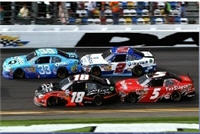
NASCAR Leads in Race to be Green
Although few would guess that NASCAR racing is the most environmentally-friendly sport out there, the franchise has worked hard for the last four years to make sure it is. An array of green initiatives including beverage container recycling, cell phone recycling and ethanol gasoline has allowed NASCAR to take the lead in the race to be green.
When racecars rev up for this year’s Daytona 500, it will be the second year in a row that ethanol-blended fuel will power their engines. Last season alone, the Sunoco Green E15 renewable racing fuel, which contains 15 percent American-made corn-based ethanol, saved racers 300,000 regular gallons of gasoline. The ethanol blend also produces 20 percent less greenhouse gas emissions.
Other racetrack-based initiatives include the recycling of batteries, oil recycling and proper disposal and limiting the time that racecar transporters idle on the track. Also, both tracks and teams are jumping on board. For example, Pocono Raceway in Pennsylvania has installed a solar farm to fuel its energy needs and contribute to the local energy grid. It is the largest of its kind for any sports arena in the nation. Additionally, Roush Fenway Racing team recycled 26,660 pounds of plastic, 100,000 pounds of steel and aluminum and 11,335 pounds of paper in 2010.
NASCAR green programs also address more general concerns about the environment. Every time a green flag is dropped, for example, the clean air program will plant 10 trees. The franchise also encourages paper reduction in the home and at the office.
The whole trend started in 2008 when Coca-Cola and Coors teamed up for a consumer recycling initiative at the races. Last year, more than 1,000 tons of cardboard, cans and bottles were recycled as a result of the same campaign.
NASCAR encourages other kinds of consumer recycling as well. The latest initiative is a partnership with Creative Recycling Systems that will promote the recycling of televisions, computers and other electronic equipment. Collection events and informational campaigns will be held to educate consumers about the importance of recycling electronics.
In the past, spectators have been provided with pre-addressed, postage-paid envelopes to recycle their used wireless phones, batteries and accessories. According to NASCAR’s managing director of green innovation, Mike Lynch, NASCAR fan families tout green households 50 percent more than non-fans, an increase in the last three years.
"Things that are good for the environment have become a competitive edge," Lynch said according to Business News Daily. "We are glad we launched it when we did."
Click here for more information.
Posted by Elizabeth Freed on Feb 27, 2012